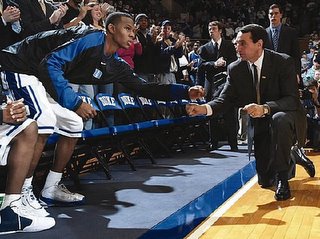
Thanks to my good friend HollywoodJosh for sending me the following e-mail below (which was sent out around Halloween of this year in regards to the Hurricane Katrina tragedy).
HollywoodJosh and his friends/acquaintances directly involved with this e-mail graduated from Dartmouth College in Hanover, NH. Dartmouth is an Ivy League university, and one of the finest academic institutions around.
the e-mail itself has been edited down for purposes of brevity, and names changed to protect anonymity. this e-mail, as well as this site, is best viewed with "medium" text option for internet explorer preferences.
Dear Friends,
Some of you I partied with as recently as last weekend; others, I haven't seen for months. In any case, I've been able to express what's going on here on the gulf coast to very few people, so I figured it was worth sending an email to all of you.
It's a long, rambling email, so for those of you who don't have time to waste, I've divided it into three sections- pleasant anecdotes, serious appeal for help, and Spinal Tap quotes.
Part 1 - Pleasant Anecdotes
When I took off for Biloxi, Mississippi nearly 30 days ago, I had never heard of the city. I didn't know a thing about what I would be doing when I got down there, and I didn't know anyone within several hundred miles of where I would be. It was going to be like my spontaneous decision to go to South Dakota, except there was no paying job involved, and I wouldn't even be afforded the luxury of a trailer (a recurring issue in these parts, as we will see). Yet looking back, I can honestly say this has been the most intense month of my life. I have seen things I never thought I would see in America. I have gone through major bouts of emotional stress, which compounded by my bizarre living arrangements, has made this whole experience seem like some crazy dream.
Day 1 ended with me covered in mud and poison, having smashed down the walls of a house with a sledgehammer, riding on the back of a pick-up truck with fifteen Air Force men and women, sweaty, tired, and feeling the cool breeze slowly wipe out the smell of garbage as we drove away from downtown East Biloxi. Our organization, Hands On USA, had teamed up with the military that day, and we were in charge. It is hard to see peoples' faces through the masks and goggles, so when the young Indian in charge of the entire work group, Ali, left the site on an urgent phone call, I was put in charge of the project due to the accidental case of mistaken identity. It was quite laughable when a major in the US Air Force consulted with me on how to go about knocking down a portion of the ceiling, but I had learned quickly the rule of thumb in Biloxi, "Just tear it down. All of it."
When people have asked me in passing how the 'rebuilding' effort is going, it is hard to explain that we are actually still too busy demolishing homes to rebuild them. To take you back, when Hurricane Katrina hit, it wrecked New Orleans. This we know. It was the most compelling thing I've ever seen on TV, in many ways more so than 9/11. We all saw it. It was the reason I came down here after a mediocre performance on the LSATs. But Mississippi? I knew there had been some damage, but the big media and punditry coverage of the Katrina's aftermath had basically amounted to: Gov. Blanco and Mayor Nagin = bad, Louisiana = terrible shape, Gov. Haley Barbour = amazing, presidential material, Mississippi= doing swell.
Truth was, the entire coastline from the Alabama/Mississippi border to New Orleans had been leveled by the storm. In Biloxi, the storm surge had created giants waves that ripped inland. Everything within several hundred feet of the shore was completely wiped out. Search for pictures of this scene online, and you'll see bases and foundations of homes with the actual house nowhere in sight. The flood pummeled the town for nearly a mile inland until receding, leaving a waterline of 10-12 feet in most of East Biloxi.
Think about how high that is.

The results of the flooding led to massive infestations of black mold, a toxic substance that renders houses unlivable. It also sadly means that all materials infested must be thrown away immediately. So when you hear about 'people losing everything', they are actually being literal. On top of all this, wind damage (like the kind that Florida hurricanes often produce) had left many infrastructures like supermarkets, hospitals, schools and police stations badly damaged. Biloxi is a city of about 60,000 people, and fortunately, there were parts of towns that were only hit by the wind damage. But anyone who has lived beachside knows, smaller coastline communities don't protrude very far inland. Thus the smaller towns on the Mississippi coast are in some cases completely ruined. There aren't even relief groups there, because no one has any idea where to begin.
There's no way of knowing how many people died here. There might be accounts in the media, but that's just silly. Who could possibly have any idea? It's not like they just took a census report last week. Without any real evacuation plan, I'm sure many people were washed out to sea without a prayer. Let's just say some of the locals won't eat seafood because they think the sea creatures have been on a human carcass diet. That was certainly the case in New Orleans, where they found a 23 foot alligator. But I digress. The point is that things here are bad. I suppose I could have just told you to think of New Orleans and then imagine 10-15 smaller versions of it, and saved everyone some time.
Politicians are, not surprisingly, utterly clueless as to what's going on. Even the Mississippi legislature had to take a field trip to Biloxi after initial legislation completely underestimated the damage. To my largely partisan email list of friends, check out the following:
A week after the hurricane, said President came to the area and toured the most ravaged parts of the country. This was shortly after the "Brownie's doing a heck of a job" comment, though before Barbara Bush's "These were poor people anyway" call. On live television, President Bush put his arms around a young man standing near his old property. "What do you need us to do for you?" the president asked. "Well," one Victor responded, "I could really use one of the FEMA trailers they've started giving out. My home is gone, and I'm living in a tent." "We'll get you your trailer," responded the pumped up commander-in-chief. We met Victor Robi last week. He still doesn't have his trailer, nearly two months later. He has no home. He has no job, because his workplace was destroyed too. He has taken to serious alcoholism, a common problem in these parts and on this email list. ABC is going to come down here and maybe tell his story. The FEMA trailer situation would be an exhaustive email in and of itself, and hopefully the Chicago Tribune writer I've gotten to come down will do a more artful telling of the story than I.
The entourage assembled here are absolutely amazing, and seem to have come out of the great American woodworks to converge on this little church warehouse. VERY little of everyone's past is discussed, which is an interesting change for me . . .
But yes, there is reason to believe that the people who wound up down here to help are partly running away from something. It could be literal, like the law. AlabamaMike does have that "I may have killed a man" look about him. But its also young people disappointed with the real world. There's almost no mention of what people did as jobs, probably because they were low paying, uninteresting, unfulfilling wastes of time. But maybe that's being a bit pessimistic. In the end life is so good here that it is a legitimate cause to end leases and quit jobs, as some have done.
It feels like living in the twisted step-child of Catch-22. Every day, crazy things are happening. The streets have a sense of lawlessness, which is particularly odd for a military town. The few times we've gone barhopping at night the nights have been predictably chaotic, given the usual relationship between tequila shots and Vietnam war veterans.
What makes this bunch so spectacular is that no matter what character flaws each individual has, we all pull together enough during the day to get great work done. Everyone loves this place, with the same passion I've seen for a fraternity, for example. It is fascinating too, as there are very few all-volunteer organizations in the entire coastal areas as large as ours, and none in this part of Mississippi that are secular. Like my relationship with the police and military, my views on the church have been somewhat affected by the many religious relief groups I see down here. They are doing the kind of work that led me to espouse faith-based initiatives, possibly the only part of the Bush agenda I have ever truly agreed with. Some people are bothered by the proselytizing component, but I couldn't care less. So what if they hand out a bible? Most people around here are passionately Christian anyway, and if a non-believer drives home with religious pamphlets, four gallons of water, enough food to feed his family for a week, and supplies to clean his house, I'd venture that he netted positive for the trip.
Part 2 - Serious Appeal For Help
To bring this home, here's what I need from you. I need you to spread the word. It doesn't have to be anything extravagant; if you run into someone at the water cooler and say, "Man, how bout that fucked up situation in Mississippi," that would already be an improvement over current awareness. Of course, it would be better if you could do more. A lot of us (on both sides) thought 2004 was the important election in a generation, but if people got as inspired to work on Hurricane Katrina relief as they did about the election, all on the same side this time, imagine how much could get done. That means emailing people. Bringing it up in conversation all the time. Maybe a letter to the editor. Taking a vacation or a break to come down here and help. Keeping the vast majority of this audience in mind, I will not ask directly for money. I will, however, note that if you are connected to someone with money, this is a more worthwhile place to send it then the Red Cross, which has apparently gone bankrupt for the first time in its history. I calculated that we spend about $500 to send 60 or so volunteers into the field every day. That's $500 to feed us, pay the electric/heating bills, buy tools for work, and use what's left over to purchase medical supplies for our street teams. If anyone is feeling particularly charitable, big contributions go to acquiring specific things, like trailers to haul trees. Wait, yes, this is worth telling. So the reason we have a crew that cuts trees is that the storm blew a lot of trees and debris into people's yards. It so happens that FEMA has a policy of only delivering trailers to people with clear yards to park them in. Fair enough. What FEMA doesn't have is a policy for how to clear giant trees and mountains of debris from peoples' yards. If it weren't for Hands On USA, hundreds of people (we wish this number were higher) would not have trailers. This, I believe, is a case where the government has failed its citizens. We cannot depend on makeshift all-volunteer groups to help victims of crises with their basic needs.
Please keep in mind that this is not an appeal for money. I'd much rather have as many of you as possible come down. Unless you lived through the Great Depression (one person on this list was born during it), this is the most devastating thing you will have ever seen on US soil. I have learned, though trite a term this is, more from this experience than any other. A month here, even with a 4 day break in the middle, has felt ten times as long. A week here and you'll go home a different person. Will this be the case during Thanksgiving? Yes. Will coming still serve some use during Christmas? Yes. Coastal Mississippi is still doing very, very poorly. I worked a distribution line last week, and got to talk to about 300 families through out the day. Many still don't have power or running water. One young woman we work with remarked that supply lines should close to prevent welfare dependency, forgetting for a brief moment that these people lost everything. And (if this makes it any different), they were not all poor. Many middle class families lost their homes. I'd say this is a fairly middle class list, skewing upper-middle. What would be your reaction if you lost every possession you had, even with a moderate bank account? How long would it take you to get your shit together?
To me this is the most important thing any of us can be doing right now. As I wrote in my Dartmouth article, I don't say that from a vantage point of condescension. I'm well aware that not having a lease or classes and having already decided to end my last job made this experience possible. But when I say this is the most important moment of our generation, I don't mean you all need to stop everything you're doing, which is in many cases also very important work. But let's think back to World War II, or at least the portrait of it handed down to us. Not everyone went to fight, but everyone chipped in. If you have influences in politics or media, now would be a good time to use them. If you have no vacation time, but have a friend or relative who does, pass the word on to them. Winter is coming, and the residents of Biloxi are living in tents. Send a blanket down here so one less person has to freeze this winter. It's going to start raining a lot fairly soon. Buy a pack of ponchos and mail it down. If you're a blogger, start talking about the relief effort on your blog. Now is the time to step up. During World War II our very nation's future was in peril. I don't want to pretend the stakes are that high. But if you have any sense of patriotism, you should be mad as hell that fellow Americans are forced to live like this. If you care about human decency around the world, what hope can you have for the 3rd world if we can't even care for the people in our own backyard?
I suppose that's all for now. I have to get up early tomorrow to watch candy fall from the sky. There a school in one of the neighboring towns, Waveland, where the kids are going to school in tents. A couple schools in Illinois adopted them, and built little packets of candy with parachutes that they are dropping on the fields by the school. It'll be on Good Morning America, 7:15am Central time. Not sure if that means 7:15 or 8:15 Eastern time.
It would mean a great deal if people could write back with questions, comments, insights, grievances, etc.
One a final note, this email was written despite the absence of the "m" key, which is broken, and only responds to repeated stabbing attempts. If you find an "m" key, I could use one in Biloxi.
Best,
J-Dawg from Dartmouth
Part 3 - This is Spinal Tap Quotes
And now, as promised, quotes from the movie Spinal Tap:
--------------------------------------------------------------------------------
[Reading a review of Spinal Tap's latest album]
Marty DiBergi: "This tasteless cover is a good indication of the lack of musical invention within. The musical growth of this band cannot even be charted. They are treading water in a sea of retarded sexuality and bad poetry."
Nigel Tufnel: That's just nitpicking, isn't it?
--------------------------------------------------------------------------------
Marty DiBergi: David St. Hubbins... I must admit I've never heard anybody with that name.
David St. Hubbins: It's an unusual name, well, he was an unusual saint, he's not a very well known saint.
Marty DiBergi: Oh, there actually is, uh... there was a Saint Hubbins?
David St. Hubbins: That's right, yes.
Marty DiBergi: What was he the saint of?
David St. Hubbins: He was the patron saint of quality footwear.
--------------------------------------------------------------------------------
[Reading a review of a Spinal Tap album]
Marty DiBergi: "This pretentious ponderous collection of religious rock psalms is enough to prompt the question, 'What day did the Lord create Spinal Tap, and couldn't he have rested on that day too?'"
--------------------------------------------------------------------------------
Lt. Hookstratten: May I start by saying how thrilled we are to have you here. We are such fans of your music and all of your records. I'm not speaking of yours personally, but the whole genre of the rock and roll.
--------------------------------------------------------------------------------
David St. Hubbins: We say, "Love your brother." We don't say it really, but...
Nigel Tufnel: We don't literally say it.
David St. Hubbins: No, we don't say it.
Nigel Tufnel: We don't really, actually mean it.
David St. Hubbins: No, we don't believe it either, but...
Nigel Tufnel: But we're not racists.
David St. Hubbins: But that message should be clear.
--------------------------------------------------------------------------------
David St. Hubbins: Dozens of people spontaneously combust each year. It's just not really widely reported.
--------------------------------------------------------------------------------
**********
Nigel Tufnel: The numbers all go to eleven. Look, right across the board, eleven, eleven, eleven and...
Marty DiBergi: Oh, I see. And most amps go up to ten?
Nigel Tufnel: Exactly.
Marty DiBergi: Does that mean it's louder? Is it any louder?
Nigel Tufnel: Well, it's one louder, isn't it? It's not ten. You see, most blokes, you know, will be playing at ten. You're on ten here, all the way up, all the way up, all the way up, you're on ten on your guitar. Where can you go from there? Where?
Marty DiBergi: I don't know.
Nigel Tufnel: Nowhere. Exactly. What we do is, if we need that extra push over the cliff, you know what we do?
Marty DiBergi: Put it up to eleven.
Nigel Tufnel: Eleven. Exactly. One louder.
Marty DiBergi: Why don't you just make ten louder and make ten be the top number and make that a little louder?
Nigel Tufnel: [pause] These go to eleven.
--------------------------------------------------------------------------------
[Nigel Tufnel is showing Marty DiBergi one of his favorite guitars]
Nigel Tufnel: The sustain, listen to it.
Marty DiBergi: I don't hear anything.
Nigel Tufnel: Well you would though, if it were playing.
--------------------------------------------------------------------------------
Derek Smalls: We're very lucky in the band in that we have two visionaries, David and Nigel, they're like poets, like Shelley and Byron. They're two distinct types of visionaries, it's like fire and ice, basically. I feel my role in the band is to be somewhere in the middle of that, kind of like lukewarm water.
--------------------------------------------------------------------------------
Marty DiBergi: Do you feel that playing rock 'n' roll music keeps you a child? That is, keeps you in a state of arrested development?
Derek Smalls: No. No. No. I feel it's like, it's more like going, going to a, a national park or something. And there's, you know, they preserve the moose. And that's, that's my childhood up there on stage. That moose, you know.
Marty DiBergi: So when you're playing you feel like a preserved moose on stage?
Derek Smalls: Yeah.
--------------------------------------------------------------------------------
Derek Smalls: Remember at Luton Palace we were talking about writing a rock musical based on the life of Jack the Ripper.
David St. Hubbins: Yeah!
[singing]
David St. Hubbins: You're a naughty one...
Derek Smalls, David St. Hubbins: Saucy Jack...
David St. Hubbins: You're a haughty one, saucy Jack.
--------------------------------------------------------------------------------
[last lines]
Nigel Tufnel: [on what he would do if he couldn't be a rock star] Well, I suppose I could, uh, work in a shop of some kind, or... or do, uh, freelance, uh, selling of some sort of, uh, product. You know...
Marty DiBergi: A salesman?
Nigel Tufnel: A salesman, like maybe in a, uh, haberdasher, or maybe like a, uh, um... a chapeau shop or something. You know, like, "Would you... what size do you wear, sir?" And then you answer me.
Marty DiBergi: Uh... seven and a quarter.
Nigel Tufnel: "I think we have that." See, something like that I could do.
Marty DiBergi: Yeah... you think you'd be happy doing something like-...
Nigel Tufnel: "No; we're all out. Do you wear black?" See, that sort of thing I think I could probably... muster up.
Marty DiBergi: Do you think you'd be happy doing that?
Nigel Tufnel: Well, I don't know - wh-wh-... what're the hours?
--------------------------------------------------------------------------------



